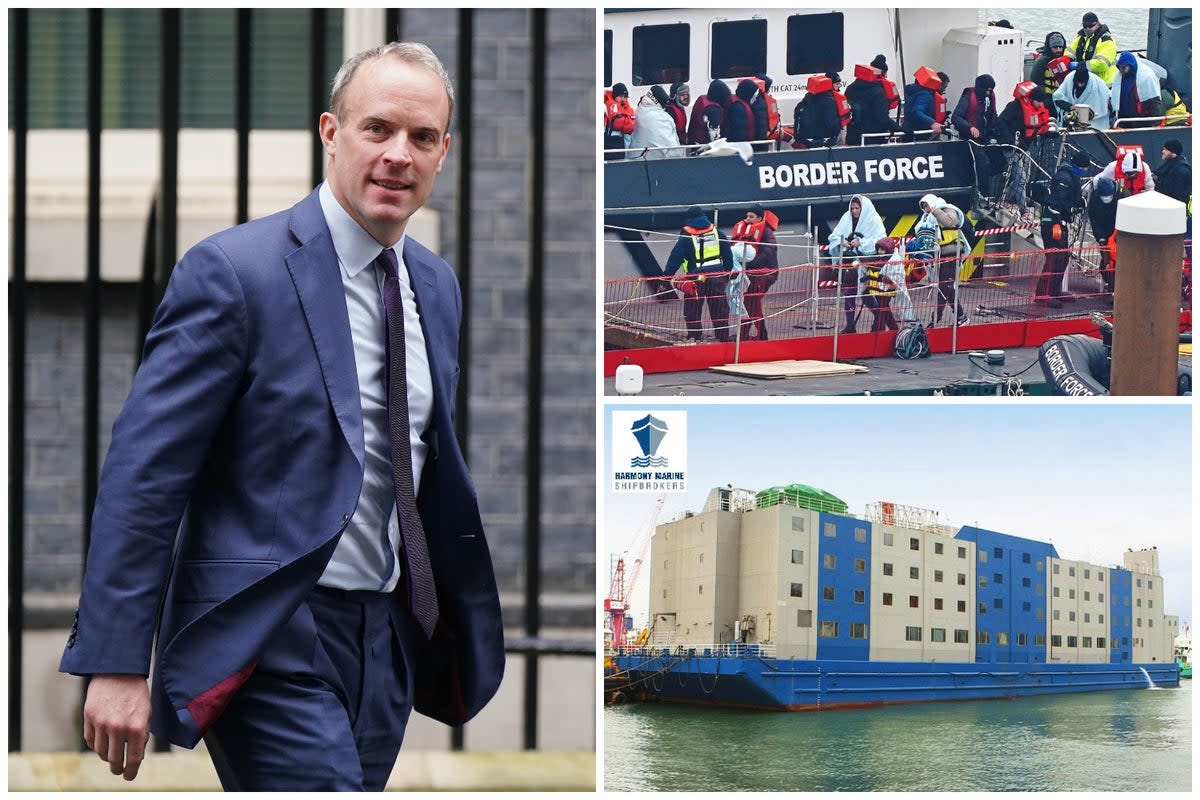Disarray over Government bid to house migrants on barges

A new bid to tackle illegal immigration was plunged into confusion on Tuesday after a Cabinet minister failed to say whether the Government had any barges to house migrants.
Deputy Prime Minister Dominic Raab said “nothing is off the table” in seeking to deal with the small boats Channel crisis, with proposals to use giant barges being publicly ramped up. But he failed five times on LBC Radio to say if the Government had any barges available.
At first he dodged the question, stressing the need to “crush the criminal gangs preying on human misery and lining their pockets on illegal immigration” and to “end the perception and the reality of people thinking that at the end of that journey they can be housed in hotels at the cost to the taxpayer of £6 million per day”. But pressed by presenter Nick Ferrari how many boats were available, Mr Raab responded: “I don’t have that figure.”
Questioned whether there were some standing by, the Justice Secretary added: “Those details will be set out by the immigration minister. Of course using vessels to do it is not uncommon in other parts of Europe.”
Asked whether any ministers at Cabinet yesterday had asked how many boats were ready to house migrants, Mr Raab said: “I never comment on the private discussions of Cabinet.” Finally, when grilled on whether some vessels had been “secured”, with contracts signed for some of them, Mr Raab said: “I don’t know about the detailed contractual position.”
Labour claimed that the Government’s proposals — to use former military sites, barges and ships instead of hotels to house migrants — would not work and that far more focus needed to be put on breaking criminal gangs and speeding up the processing of asylum claims. Shadow health secretary Wes Streeting: “It’s going to add to the cost of a broken immigration system.”
However, he did not oppose the use of barges, stressing instead minimum standards for accommodation should be met.
Alistair Carmichael, Liberal Democrat home affairs spokesman, said: “This plan is only necessary because last year the Home Office only processed four per cent of asylum applications from people crossing the Channel. The Government should devote more energy to tackling this appalling backlog rather than generating a daily gimmick to distract attention from their failure.”
Immigration minister Robert Jenrick was expected to announce this afternoon the use of two military sites — RAF Wethersfield, Essex, and RAF Scampton, Lincolnshire — as he tries to reduce the £6.8 million a day the Government says it spends on hotel accommodation.
The plans are likely to be controversial, with Foreign Secretary James Cleverly having criticised suggestions that the base in his Essex constituency would be used. He argued that it was unsuitable given the “remote nature of the site, the limited transport infrastructure and narrow road network”.
Conservative former minister Sir Edward Leigh, the MP for Gainsborough, has previously criticised the use of Scampton, the former home of the Dambusters and Red Arrows which sits in his constituency.
As of this morning, the proposed sites had not yet been confirmed as RAF Wethersfield and RAF Scampton. But Tory-run Braintree district council has confirmed it has its legal challenge ready to go to the High Court “imminently” against the Wethersfield plan.
Government sources also downplayed the likelihood of barges and ferries being used imminently, saying none had been purchased yet. One said there is a “direction of travel” towards using ferries and barges as well but said “nothing has been bought”.
The Refugee Council said it was “deeply concerned” by the new accommodation plans, describing them as “entirely unsuitable” to the needs of asylum seekers. Enver Solomon, the charity’s chief executive, said: “These sites are wholly inadequate places to house vulnerable men, women and children who have come to our country in search of safety. We must ensure that people fleeing war, conflict and persecution can access safe, dignified, and appropriate accommodation while in the UK asylum system. They are also unworkable and will add yet more cost and chaos to the system.”
Thousands of people have already crossed the Channel in often unseaworthy “small boats” this year, with more than 45,000 having arrived in the UK in this way last year.
Appearing before the Commons Liaison Committee, Rishi Sunak downplayed suggestions that flights under the Government’s stalled Rwanda policy would begin this summer, despite Home Secretary Suella Braverman raising expectations that this would happen.
Meanwhile, London Councils said it was “very concerned by the lack of alternative housing options” for Afghan families who will be asked to leave hotels by the end of April under plans aimed at moving refugees into more permanent accommodation and reducing Government hotel bills.
The cross-party group, which represents 32 London boroughs, said rehoming refugees was “a particular challenge in the capital due to the chronic shortage of affordable housing”. About 8,000 Afghans are still in hotels across the country after being evacuated from Kabul. A London Councils spokesman said: “The closing of hotels without sufficient move-on support could impact a number of families and present significant challenges for local authorities.”


